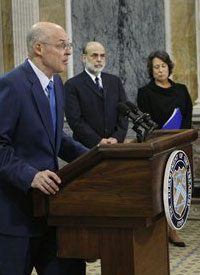
"Government owning a stake in any private U.S. company is objectionable to most Americans — me included," Paulson said at a Tuesday press conference, before leaving no doubt that America’s new financial führer intends to take full advantage of his extraordinary new powers. "[The] alternative of leaving businesses and consumers without access to financing is totally unacceptable."
At the same press conference, Fed chairman Ben Bernanke announced that the Federal Reserve would begin on October 27 buying massive amounts of commercial paper — the short-term debt that companies loan to one another — in the latest of a dizzying series of power grabs whereby the Federal Reserve has expanded its already considerable control over the U.S. financial system.
According to the Treasury Department’s official statement purporting to explain the coordinated actions of the Fed and the Treasury Department, "Combined, our actions are extensive, powerful and transformative. They demonstrate that the government will do what is necessary to restore the flow of funds on which our economy depends."
Transformative indeed. Not since the New Deal has America undergone a seizure of federal government power of this magnitude. In the wake of the passage of the Emergency Economic Stabilization Act of 2008, Americans are waking up to the fact that the misnamed "bailout bill" is first and foremost about restructuring and empowering the federal government, a veritable Patriot Act for the financial sector. And with hundreds of billions of dollars still left to spend, we can only wonder what else the government will deem "necessary" to put an end to financial freedom as we know it.



